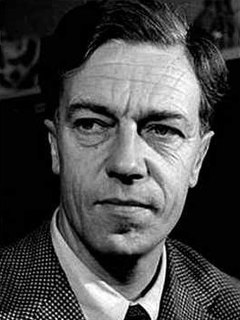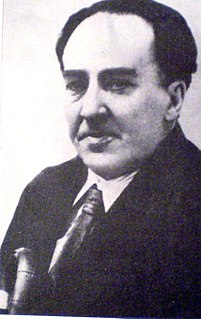A Quote by C. Day Lewis
We do not write in order to be understood; we write in order to understand.
Quote Topics
Related Quotes
In my lifetime I was to write only one book, this would be the one. Just as the past Lingers in the present, all my writings after night, including those that deal with biblical, Talmudic, or Hasidic themes, profoundly bear it's stamp, and cannot be understood if one has not read this very first of my works. Why did I write it? Did I write it so as not to go mad or, on the contrary, to go mad in order to understand the nature of the madness, the immense, terrifying madness that had erupted in history and in the conscience of mankind?
Thoughts are created in the act of writing. [It is a myth that] you must have something to say in order to write. Reality: You often need to write in order to have anything to say. Thought comes with writing, and writing may never come if it is postponed until we are satisfied that we have something to say...The assertion of write first, see what you had to say later applies to all manifestations of written language, to letters...as well as to diaries and journals
Write what you want to read. So many people think they need to write a particular kind of book, or imitate a successful style, in order to be published. I've known people who felt they had to model their book on existing blockbusters, or write in a genre that's supposed to be "hot right now" in order to get agents and publishers interested. But if you're writing in a genre you don't like, or modeling yourself on a book you don't respect, it'll show through. You're your first, most important reader, so write the book that reader really wants to read.
It is all, as usual, paradox. I have to use what intellect I have in order to write books, but I write the kind of books I do in order that I may try to set down glimpses of things that are on the other side of the intellect. We do not go around and discard the intellect, but we must go through and beyond it.
I should be at peace. I have understood. Don't some say that peace comes when you understand? I have understood. I should be at peace. Who said that peace derives from the contemplation of order, order understood, enjoyed, realized without residuum, in joy and truimph, the end of effort? All is clear, limpid; the eye rests on the whole and on the parts and sees how the parts have conspired to make the whole; it perceives the center where the lymph flows, the breath, the root of the whys.
Part of the main plan of imperialism... is that we will give you your history, we will write it for you, we will re-order the past...What's more truly frightening is the defacement, the mutilation, and ultimately the eradication of history in order to create... an order that is favorable to the United States.







































